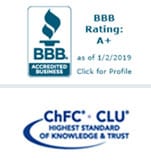
Taking a summer vacation? You’ve probably been planning for weeks or even months! But are you giving your finances the same attention? A recent survey found that more Americans are concerned about affording vacations than saving for retirement. The way we see it, though, retirement is the ultimate vacation: you choose how you spend your time, all day, every day. And like any other vacation, the key to a blissful retirement is preparation.
Pack Your Suitcase
It’s the night before (or even the morning of) your big trip to Aruba. Your suitcase is open on the bed while you race from one room to another, frantically collecting clothes, toiletries, travel guides, and electronics. Now imagine that your suitcase is an IRA or 401(k) and instead of socks and beach towels, you need to pack enough money to see you through your golden years. For most of us, shoving $100-500K into a retirement account the night before we retire is not an option. Accumulating money takes time. That’s why it’s never too early to start packing for retirement.
We recommend saving at least 10 -15% of your salary each year. A good goal is to have ten times your annual salary saved by the time you retire, although that number will vary depending on your unique situation. Sit down with a financial professional to determine how much you will need to consider your savings suitcase fully “packed.”
Plan Your Itinerary
There’s a lot you can do on your own to plan for a vacation, and a travel agent can help figure out many of the details. Similarly, it’s important to find a financial professional who takes the time to get to know your unique situation. Play an active role in your finances and work with your professional to create a comprehensive financial plan that covers everything from retirement income to long-term care and estate planning.
Protect Your Home
Have you ever left for vacation, only to turn around a few blocks later to make sure you shut the garage door? We protect our homes by locking up and asking the neighbors to watch over them while we’re on vacation. Paying off your mortgage before entering retirement is a good way to protect your finances since your mortgage is likely your largest debt. Your goal should be to enter retirement debt-free, which includes your mortgage as well as credit card debt, a child or grandchild’s student loans, and car payments. Sit down, organize your debt, and commit to paying it off.
Prepare for the Unexpected
Vacations can be full of surprises: the freak hurricane that strands your plane on the tarmac, the bout of food poisoning that keeps you lying in bed instead of poolside. You can’t plan for everything. The same is true of retirement. But you can be prepared with an emergency fund. This fund should contain three to six months of income that you can access at any time to cover unexpected expenses, like a medical bill, car repair, or home repair. Life has a way of happening, often expensively. An emergency fund will help you avoid going into debt when it does.
Get a Five-Star Review
Instead of researching five-star hotels, work on getting your own five-star review by striving for a perfect credit score. Like travelers scoping out resorts that have a history of good service, creditors view your credit score as a history of responsible spending and use it to determine if you qualify for certain loans. You can build your score by paying bills on time and not using more than 30% of your available credit. You can get a free report once a year from each of the three major credit bureaus. Make sure you look it over for mistakes and dispute any errors.
Don’t miss Roger Cowen sharing these and other retirement planning tips with WTNH News 8 on Sunday, August 5th at 6:45 a.m.




